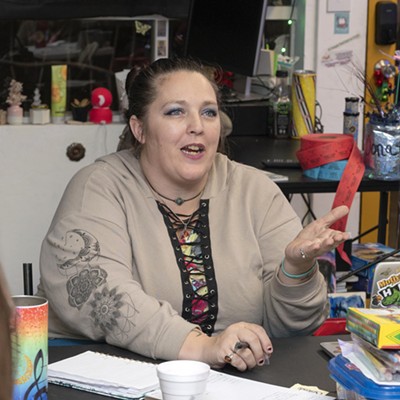The Pima County Board of Supervisors voted 3-2 Thursday, May 21, to revise emergency amendments to the county's health code for restaurants and bars after restaurant owners complained the new rules were too burdensome and Attorney General Mark Brnovich launched an investigation into the rules at the request of local GOP state lawmakers.
Thursday's vote was along party lines, with Democratic Supervisors Ramon Valadez, Sharon Bronson and Betty Villegas voting for the changes and GOP Supervisors Ally Miller and Steve Christy voting against them.
Some of the most significant revisions include removal of the $500 civil penalty, allowing bartop seating as long as six-foot distancing requirements are met and nixing 50 percent occupancy guidelines if physical distancing allows for higher occupancy.
"I think we have adequately captured all of the information that has been provided. I think our revision that we had Tuesday afternoon was based on a large part from the comments we've received here," Pima County Administrator Huckelberry said before reading the revisions.
The board also clarified that parties—not individuals—must be spaced 6 feet apart to be in compliance with the proclamation. The county is limiting dining parties to 10 or fewer people. Servers are not required to wear gloves and only have to follow current health code handwashing policies, instead of documenting each hand sanitization or glove change.
"The specificity of number (to a party) has been left out on purpose," Huckelberry said. "Typically it's two, but it could be if we follow the same language in the policy, it's up to 10 per party."
Josh Jacobsen, owner of three southside Lucky Wishbone restaurants and a board member of the Arizona Restaurant Association, worked with supervisors before Thursday's vote. He said his intention was to communicate restaurant owners' concerns while trying to find solutions all parties could live with.
"You can always get stuff done when you're willing to be respectful and try to work together since we all have differing views," Jacobsen said.
While Jacobsen said he's pleased supervisors revised their original proclamation which added 15 new guidelines to the county's current health code, he wishes the county would revert the temporary regulations back to best practices originally agreed upon by the Back to Business Bars and Restaurants Task Force last month.
"Overall we are happy but also we would like to see the consequences taken away and go back to where this all started in the beginning, where we thought these were just going to be guidelines," Jacobsen said. "The restaurant industry was entrusted to keep the public safe long before the pandemic began and I think we've earned that trust working alongside the Pima County Health Department. We would like the restaurant industry to continue to have that trust even though the pandemic is here."
Supervisor Steve Christy has been opposed to new rules from the start. Christy said he thinks the board has been "ignoring the 500-pound elephant in the room": Brnovich's investigation. Should the Attorney General's Office decide Pima County's proclamation is in violation of the governor's orders and rescind it, Christy argues all that time spent was a waste.
"We've been struggling with this for some time now and all the while the restaurant business has been struggling even deeper, trying to stay in business while trying to understand with clarity what direction they're supposed to be following," Christy said. "The state's attorney general, and I feel like he would be justified, will probably render a decision that everything that's been submitted and produced in terms of regulations by Pima County has been in direct violation to the governor's executive order and he will toss everything out."
Chief Civil Deputy County Attorney Andrew Flagg responded to Brnovich's inquiry last week. In the letter, Flagg argues the county's new revisions are in compliance with Gov. Doug Ducey's May 12 executive order, thus making the three GOP lawmakers' original complaint moot.
"County's orders are in addition to the Governor's orders in the sense that they provide more detailed implementation of his requirements, they are not inconsistent with the Governor's orders," Flagg wrote in the county's response.
Flagg points out Pima County has "good reason to make more detailed temporary measures" since the county has the fourth-highest COVID-19 fatality rate in the state behind Navajo, Coconino and Apache counties and nearly double Maricopa County's fatality rate for the disease.
In addition, Flagg also contends Gov. Ducey's executive order limiting counties from taking further emergency action exceeds its authority by citing the Arizona Constitution, which states that only the Legislature and the people themselves have lawmaking power.
"Gov. Ducey has no authority to, with the stroke of a pen, prohibit additional, consistent emergency actions by a county or swipe away public-health authority granted by the Legislature," Flagg wrote in his response. "To the extent Governor Ducey, in paragraph 7 of Executive Order 2020-36, purported to prohibit emergency actions by counties other than those inconsistent with his order, or to take away counties' broad public-health authority, he plainly overreached."
During Thursday's Supervisors meeting Christy called out Valadez for sending a copy of the proclamation to Gov. Ducey with a letter stating the board had endorsed the regulations, without letting the board see the letter first. The regulations were passed the following day.
"I noticed you copied this letter to a number of elected officials throughout the region," Christy said. "My question is why was not any of this letter of yours copied to the members of the Board of Supervisors?"
Valadez apologized to Christy, stating it was "an oversight" on the chairman's part.










